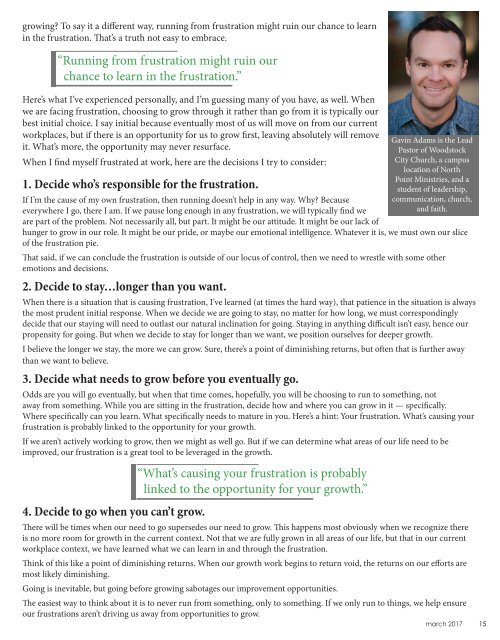GOODlife Magazine March 2017
Featuring Megan Alexander on this month's cover, GOODlife Magazine is a premier Christian print and digital magazine. We capture readers with captivating articles, including regular interviews with prominent leaders and artists and topics such as family, business, travel, events, and so much more!
Featuring Megan Alexander on this month's cover, GOODlife Magazine is a premier Christian print and digital magazine. We capture readers with captivating articles, including regular interviews with prominent leaders and artists and topics such as family, business, travel, events, and so much more!
You also want an ePaper? Increase the reach of your titles
YUMPU automatically turns print PDFs into web optimized ePapers that Google loves.
growing? To say it a different way, running from frustration might ruin our chance to learn<br />
in the frustration. That’s a truth not easy to embrace.<br />
“Running from frustration might ruin our<br />
chance to learn in the frustration.”<br />
Here’s what I’ve experienced personally, and I’m guessing many of you have, as well. When<br />
we are facing frustration, choosing to grow through it rather than go from it is typically our<br />
best initial choice. I say initial because eventually most of us will move on from our current<br />
workplaces, but if there is an opportunity for us to grow first, leaving absolutely will remove<br />
it. What’s more, the opportunity may never resurface.<br />
When I find myself frustrated at work, here are the decisions I try to consider:<br />
1. Decide who’s responsible for the frustration.<br />
If I’m the cause of my own frustration, then running doesn’t help in any way. Why? Because<br />
everywhere I go, there I am. If we pause long enough in any frustration, we will typically find we<br />
are part of the problem. Not necessarily all, but part. It might be our attitude. It might be our lack of<br />
hunger to grow in our role. It might be our pride, or maybe our emotional intelligence. Whatever it is, we must own our slice<br />
of the frustration pie.<br />
That said, if we can conclude the frustration is outside of our locus of control, then we need to wrestle with some other<br />
emotions and decisions.<br />
2. Decide to stay…longer than you want.<br />
When there is a situation that is causing frustration, I’ve learned (at times the hard way), that patience in the situation is always<br />
the most prudent initial response. When we decide we are going to stay, no matter for how long, we must correspondingly<br />
decide that our staying will need to outlast our natural inclination for going. Staying in anything difficult isn’t easy, hence our<br />
propensity for going. But when we decide to stay for longer than we want, we position ourselves for deeper growth.<br />
I believe the longer we stay, the more we can grow. Sure, there’s a point of diminishing returns, but often that is further away<br />
than we want to believe.<br />
3. Decide what needs to grow before you eventually go.<br />
Odds are you will go eventually, but when that time comes, hopefully, you will be choosing to run to something, not<br />
away from something. While you are sitting in the frustration, decide how and where you can grow in it — specifically.<br />
Where specifically can you learn. What specifically needs to mature in you. Here’s a hint: Your frustration. What’s causing your<br />
frustration is probably linked to the opportunity for your growth.<br />
If we aren’t actively working to grow, then we might as well go. But if we can determine what areas of our life need to be<br />
improved, our frustration is a great tool to be leveraged in the growth.<br />
4. Decide to go when you can’t grow.<br />
“What’s causing your frustration is probably<br />
linked to the opportunity for your growth.”<br />
Gavin Adams is the Lead<br />
Pastor of Woodstock<br />
City Church, a campus<br />
location of North<br />
Point Ministries, and a<br />
student of leadership,<br />
communication, church,<br />
and faith.<br />
There will be times when our need to go supersedes our need to grow. This happens most obviously when we recognize there<br />
is no more room for growth in the current context. Not that we are fully grown in all areas of our life, but that in our current<br />
workplace context, we have learned what we can learn in and through the frustration.<br />
Think of this like a point of diminishing returns. When our growth work begins to return void, the returns on our efforts are<br />
most likely diminishing.<br />
Going is inevitable, but going before growing sabotages our improvement opportunities.<br />
The easiest way to think about it is to never run from something, only to something. If we only run to things, we help ensure<br />
our frustrations aren’t driving us away from opportunities to grow.<br />
march <strong>2017</strong> 15

















